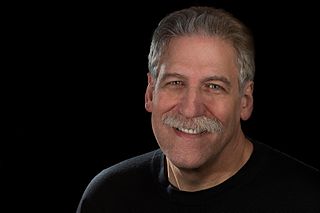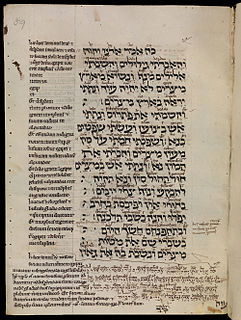Related Research Articles

She’ol, in the Hebrew Bible, is a place of darkness to which all the dead go, both the righteous and the unrighteous, regardless of the moral choices made in life, a place of stillness and darkness cut off from life but not God because as per written in Book of Psalm 139:8 "If I ascend to heaven, You are there; If I make my bed in Sheol, behold, You are there." The inhabitants of Sheol are the "shades" (rephaim), entities without personality or strength. Under some circumstances they are thought to be able to be contacted by the living, as the Witch of Endor contacts the shade of Samuel for Saul, but such practices are forbidden.

Jemima was the oldest of the three beautiful daughters of Job, named in the Bible as given to him in the later part of his life, after God made Job prosperous again. Jemima's sisters are named as Keziah and Keren-Happuch. Job's sons, in contrast, are not named.
Peter Eric Enns is an American Biblical scholar and theologian. He has written widely on hermeneutics, the relationship between religion and science, the creation–evolution controversy, and Old Testament interpretation. Outside of his academic work Enns is a contributor to HuffPost and Patheos. He has also worked with Francis Collins' The BioLogos Foundation. His book Inspiration and Incarnation challenged conservative/mainstream Evangelical methods of biblical interpretation. His book The Evolution of Adam questions the belief that Adam was a historical figure. He also wrote The Bible Tells Me So: Why Defending Scripture Has Made Us Unable to Read It and The Sin of Certainty: Why God Desires Our Trust More than Our 'Correct' Beliefs.
Tremper Longman III is an Old Testament scholar, theologian, professor and author of several books, including 2009 ECPA Christian Book Award winner Dictionary of the Old Testament: Wisdom, Poetry & Writings.
Mark Lehman Strauss is an American biblical scholar and professor of the New Testament at Bethel Seminary San Diego, which is part of Bethel University, Minnesota. His areas of expertise include New Testament Gospels and Bible translation.

The New Testament uses a number of athletic metaphors in discussing Christianity, especially in the Pauline epistles and the Epistle to the Hebrews. Such metaphors also appear in the writings of contemporary philosophers, such as Epictetus and Philo, drawing on the tradition of the Olympic Games, and this may have influenced New Testament use of the imagery.
David E. Garland served as the interim president of Baylor University, in Waco, Texas. His term began in June 2016 amid the Baylor sexual assault scandal and resignation of former president Ken Starr. Garland's term concluded May 31, 2017.
Roland Kenneth Harrison was an Old Testament scholar.
Hobah was a biblical place mentioned only in Genesis 14:15. When Abraham rescued his nephew Lot, the biblical account relates that he pursued his captors as far north as Hobah. He pursued the four Kings who had pillaged Sodom and Gomorrah. It is said to be north of Damascus in the Bible. It is mentioned in the aftermath of the Battle of Siddim. Although suggestions have been made for the exact location of Hobah, it is unknown.

Raymond Bryan Dillard was a professor of Old Testament language and literature at Westminster Theological Seminary.
John Alexander 'Alec' Motyer was an Irish biblical scholar. He was Vice-Principal of Clifton Theological College and vicar of St. Luke's, Hampstead and Christ Church, Westbourne (Bournemouth), before becoming Principal of Trinity College, Bristol. He spent his later years in Poynton, Cheshire.
Peter Campbell Craigie was a British biblical scholar.

Michael L. Brown is a Christian radio host, author, professor and noted proponent of Messianic Judaism, and serves as a leader of the Charismatic Movement. His nationally syndicated radio show, The Line of Fire, airs throughout the United States. He regularly contributes articles to the Christian news platform The Stream, as well as to the politically conservative news site TownHall.com, and serves as head of the Coalition of Conscience, a Christian organization in the Charlotte, North Carolina area. He also holds a Ph.D in Near Eastern Languages and Literature from New York University.

Ezekiel 48 is the forty-eighth chapter of the Book of Ezekiel in the Hebrew Bible or the Old Testament of the Christian Bible. This book contains the prophecies spoken by the prophet Ezekiel, and is a part of the Books of the Prophets. Chapters 40-48 give the ideal picture of a new temple. This chapter contains Ezekiel's vision of the portions of the twelve tribes, Ezekiel 48:1-7,23-29, of the sanctuary, Ezekiel 48:8-14, of the city and suburbs, Ezekiel 48:15-20, and of the prince, Ezekiel 48:21,22; and the dimensions and gates of the city, Ezekiel 48:30-35.
Tyndale Old Testament Commentaries is a series of commentaries in English on the Old Testament. It is published by the Inter-Varsity Press.

Ezekiel 24 is the twenty-fourth chapter of the Book of Ezekiel in the Hebrew Bible or the Old Testament of the Christian Bible. This book is attributed to the prophet Ezekiel, and is one of the Books of the Prophets.

Ezekiel 27 is the twenty-seventh chapter of the Book of Ezekiel in the Hebrew Bible or the Old Testament of the Christian Bible. This book contains the prophecies spoken by the prophet Ezekiel, and is one of the Books of the Prophets. This chapter contains a lamentation for the fallen city of Tyre.

Ezekiel 42 is the forty-second chapter of the Book of Ezekiel in the Hebrew Bible or the Old Testament of the Christian Bible. This book contains the prophecies spoken by the prophet Ezekiel, and is a part of the Books of the Prophets. Chapters 40-48 give the ideal picture of a new temple. This chapter contains Ezekiel's vision of the chambers for the priests, Ezekiel 42:1-12; the use thereof, Ezekiel 42:13,14; the measures of the outward court, Ezekiel 42:15-20.

Ezekiel 46 is the forty-sixth chapter of the Book of Ezekiel in the Hebrew Bible or the Old Testament of the Christian Bible. This book contains the prophecies spoken by the prophet Ezekiel, and is a part of the Books of the Prophets. Chapters 40-48 give the ideal picture of a new temple. This chapter contains Ezekiel's vision of the ordinances for the prince in his worship, Ezekiel 46:1-8, and for the people, Ezekiel 46:9-15; an order for the prince's inheritance, Ezekiel 46:16-18; the courts for boiling and baking, Ezekiel 46:19-24.

Ezekiel 47 is the forty-seventh chapter of the Book of Ezekiel in the Hebrew Bible or the Old Testament of the Christian Bible. This book contains the prophecies spoken by the prophet Ezekiel, and is a part of the Books of the Prophets. Chapters 40-48 give the ideal picture of a new temple. This chapter contains Ezekiel's vision of the holy waters, Ezekiel 47:1-5; and their virtue, Ezekiel 47:6-12; the borders of the land, Ezekiel 47:13-21; the division of it by lot, Ezekiel 47:22,23.
References
- ↑ NIV: Ezekiel 47:15
- ↑ NIV: Ezekiel 48:1
- ↑ The Illustrated Bible Dictionary Volume 2 page 646 ISBN 978-0-85110-628-1
- ↑ Tremper III Longman (1 August 2013). The Baker Illustrated Bible Dictionary. Baker Books. p. 1320. ISBN 978-1-4412-3886-3.
| This article related to the Hebrew Bible is a stub. You can help Wikipedia by expanding it. |